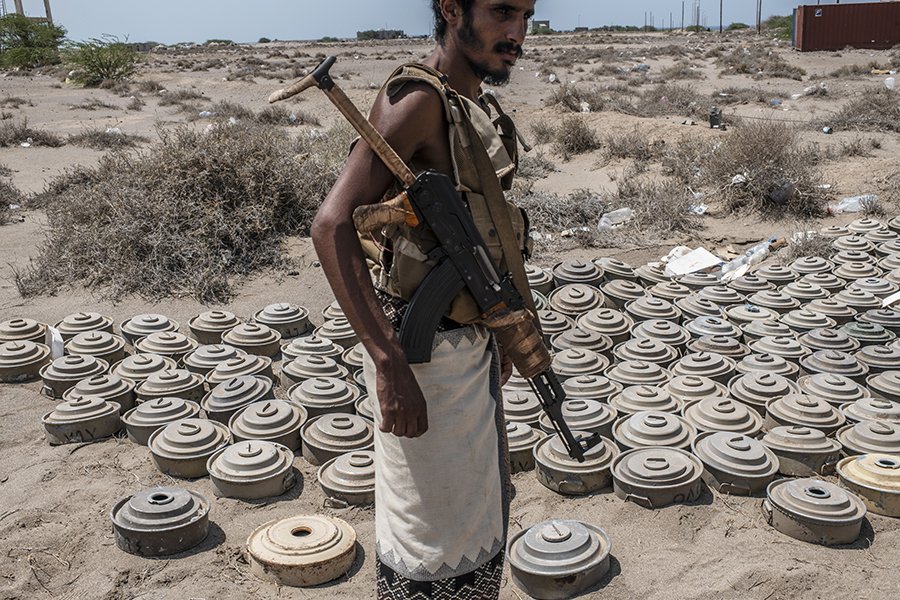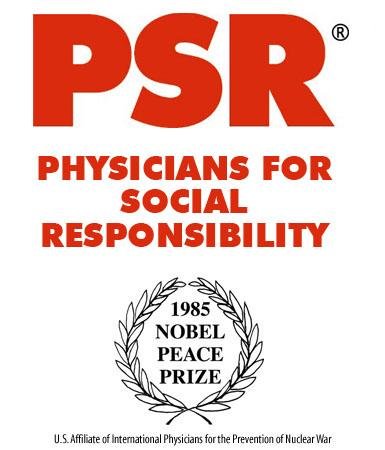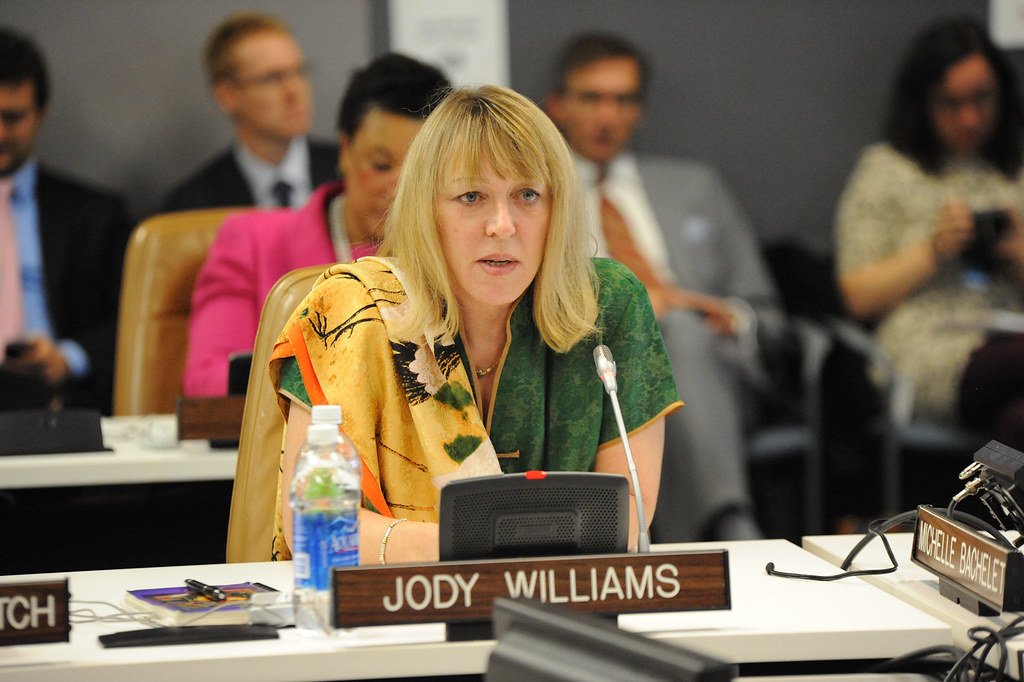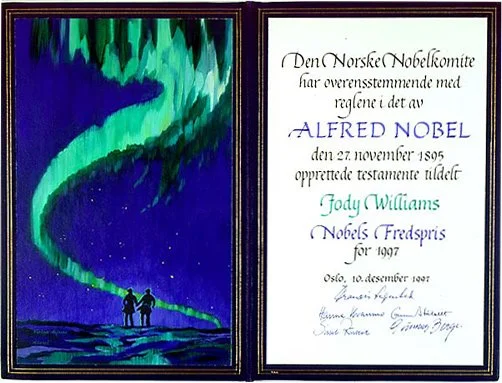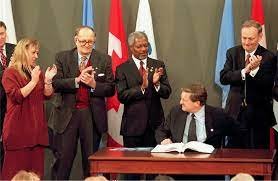THE WOMAN IN THE MINEFIELDS
Thousands march for peace, millions hope or pray. Peacemakers get busy.
The landmine has been called “the perfect soldier: Ever courageous, never sleeps, never misses.” By the 1980s, some 100 million landmines lay buried and millions more sat in stockpiles. Long after each armistice, the mines waited to kill or maim whoever touched them. Farmers. Mothers. Children at play.
A 1982 U.N. treaty banning landmines was a failure. Just 30 nations signed; few were in compliance. Someone needed to do something. Somehow a group of Vietnam vets knew that someone was Jody Williams.
Raised in Vermont, Williams grew up a fighter. When bullies teased her older brother, born deaf, Williams rode her bike at them “screaming like a banshee.” When she learned she could not be an altar boy, she read stories of saints and martyrs. “I, too, wanted to be resolute and heroic and leave a big mark on the world.” But she was just a kid from Vermont — until. . .
After protesting Vietnam, Williams moved on to the work peacework demands to pay the bills. She taught ESL, worked as a temp and a secretary. But bigger concerns — from nuclear winter to war in Central America — nagged at her. “I needed to act, not sit around and fret about things.”
Grad school in International Relations was “a terrible fit.” Future diplomats branded her “a leftist” but she mastered international economics, then took her expertise to El Salvador. There she was targeted by Death Squads, drained by suffering, burnt by the sun.
Back in DC in 1991, Williams hoped to “lose myself in a regular nine-to-five job.” Then one afternoon, a friend needed a ride to a Vietnam vets meeting. The vets had returned to “Nam” only to find that “landmines hadn’t gone home with the soldiers. Once in the ground, they waited in deadly silence until the unsuspecting stepped on them or picked them up.”
Impressed by Williams work bringing wounded Salvadoran children to the U.S., vets asked her to focus on landmines. They wanted an international ban, a mine-free world. “I rolled my eyes, looked at them like they were completely mad, and laughed out loud.”
When the laughter faded, Williams saw photos of children with missing limbs. Mines gray, gritty, and deadly. Someone had to do something. Why not her?
Working out of her DC apartment, Williams formed the International Campaign to Ban Landmines (ICBL). With a staff of one — herself — she reached out to NGOs, the U.N., presidents, pundits, celebrities. Others peaceworkers marched or signed petitions. Williams used fax and e-mail.
“Because the fax was new then, it was ‘techno-sexy,’ so to speak. If you got a fax, it meant you’d received something important that needed immediate attention. . . E-mail was an even more efficient tool.”
Leveraging her passion, micro-managing each moment, Williams worked on. Human Rights Watch lent its video on landmines in Cambodia — “The Coward’s War.” Vermont senator Patrick Leahy, having visited landmine victims in El Salvador, got the Senate to unanimously back a one-year moratorium on mines, signed by President Bush.
The European Parliament soon urged a five-year moratorium. Then came international conferences and outreaches to Pope John Paul II, President Clinton, Princess Diana, the Red Cross, and parliament after parliament.
Often in jeans and cowboy boots — “I didn’t care if the policy makers liked what I wore“ — Williams met diplomats and generals who “provided clean and easy justification for the weapons.” She persisted.
Other groups held conferences in London or Paris but Williams organized meetings around the globe. By 1996, twenty nations had banned landmines. That fall, the Canadian prime minister drafted a treaty. And on September 18, 1997, three-quarters of the world’s nations signed the Ottawa Treaty pledging to destroy their stockpiles within four years and clear existing minefields within ten.
A month later, the Nobel Peace Prize went to the ICBL and Jody Williams. The Nobel committee called the ICBL “a model for similar processes in the future [that] could prove of decisive importance to the international effort for disarmament and peace.”
Williams got the news in Putney, Vermont. Her small home on a dirt road had no TV, no radio, so she was stunned when, moments after getting a call from Oslo, reporters began filling her front lawn. She spent the day before cameras, then went back to work.
More nations signed. Then came the hard part — removal of buried mines, destruction of stockpiles. The ICBL soon established The Monitor, a watchdog agency applying international law to landmine removal. Within a few years, dozens of nations had destroyed stockpiles. Buried mines were delicately removed.
No one pretends the battle is won. Mines still kill or maim 5,000 people annually, but the number is half what it was in 1999. Some 40 million landmines have been destroyed. The Ottawa Treaty has 164 signature nations (but not the US, Russia, or China).
Williams, now a professor of Peace and Social Justice at the University of Houston, remains alarmed, and armed with her tools — organization, hope, and persistence. “If you really want to make a change,” she tells her students, “just get up off your ass and do it.”






